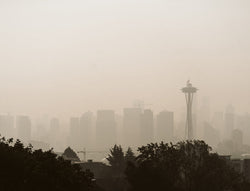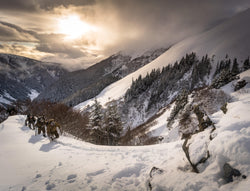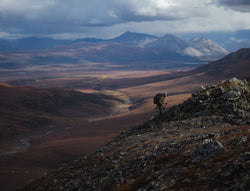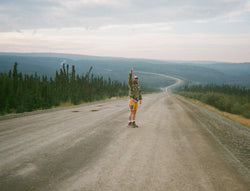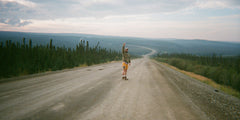
What drives someone to run 860 miles across the wilds of Alaska? For Devon McLaughlin, it’s more than a feat of endurance—it's a test of mindset, preparation, and the human spirit. This summer, he’s tackling one of the most remote and punishing environments on Earth, one mile at a time. We caught up with him before the journey for a Q&A about gear, grit, and what it means to truly be prepared. At Uncharted, we believe preparedness fuels possibility, and Devon’s story is a testament to just that.
The Challenge & Motivation
1. (Uncharted) Running 860 miles across Alaska in 18 days—how did this idea even come about?
Devon: I began running three years ago to overcome feeling stuck in life, without real goals or aspirations. That soon evolved into finding confidence by pushing myself. While visiting my friend Tommy in Alaska in 2023, we traveled to Deadhorse on the Dalton Highway, a remote 495-mile dirt trucking road. Meeting athletes along that route sparked my curiosity, especially Jaehong from South Korea, biking from Alaska to Argentina. Seeing him chase the impossible made me wonder what I could achieve. Within days, I decided to run Alaska from top to bottom.

2. Do you know of anyone else that has attempted this?
As far as I know, nobody has attempted this route as a run.
3. What’s the motivation behind this challenge?
I think comfort zones limit growth. By intentionally seeking discomfort, you grow in unexpected ways. I hope my journey inspires others to embrace discomfort and chase their dreams.
4. What do you think will be the toughest moment?
Physically, my body will break down—that’s part of the plan. This is more of a mental battle, relying on willpower when my body is already broken. Getting up daily to run another 50 miles when already exhausted will be toughest. I'm looking forward to it.

Physical & Mental Fitness
5. You’re running nearly two marathons a day for 18 days straight. How have you trained your body to handle that level of endurance?
I've trained for over a year and a half, stacking long runs and manual labor daily. Even with professional coaching, nothing fully prepares you physically—mental strength ultimately carries you through.
6. How do you prepare mentally for something this extreme?
Mental preparation is critical. I regularly engage in intentionally uncomfortable activities—ice baths, early gym sessions, treadmill runs without music—to strengthen my mental discipline.
7. When your body is screaming to stop, how do you keep going?
One step at a time. You can always take one more step. It’s just pain.
Logistics & Preparation
8. What does a typical day on the run look like?
Wake around 6-7 am, eat a large breakfast, prep gear and nutrition, warm-up, then run 8-12 hours daily. Post-run involves immediate recovery in our camper.
9. What’s your plan for nutrition and hydration?
Around 12,000 calories daily with plenty of fluids and electrolytes. Testing sessions will help dial this in—expect lots of ice cream, protein, and bananas.
10. What kind of gear are you relying on?
Alongside running gear, we have camping supplies, emergency equipment, and an over-cab camper. We'll prepare thoroughly for harsh weather and mechanical issues.
11. What piece of Uncharted Supply gear do you think will come in handy the most?
The Zeus Air jump starter and inflator is crucial for potential flats or dead batteries in remote areas. The Vault duffle bag will protect rooftop cargo from harsh weather.

12. What does the logistics side of this look like?
Starting from Connecticut, we'll drive to Alaska, camp in our truck camper powered by solar and alternator charging. Tommy will drive to each new campsite daily, meeting me for nutrition drops via Garmin InReach.
13. How do you plan to deal with unexpected challenges—like injuries, weather, or lost gear?
Multiple first aid kits and compression gear for injuries. Weather is mild at that time; gear losses hopefully occur near towns.

Community & Support
14. How has the running and adventure community supported you in this challenge?
Minimal but meaningful support through advice and connections. Some doubt due to lack of exposure, but I'm confident the right people will hear about it.
15. Are people joining you for parts of the run?
Yes—Alaskan residents, my brother, and Jaehong from South Korea will join for segments.
16. What impact do you hope this challenge has on others?
To inspire others to chase dreams, showing an average person achieving something extraordinary simply through persistence.
Survival & Resourcefulness
17. You’ll be in remote areas with limited resources—how do you stay prepared?
Past camping experiences taught me essentials: water filtration, multiple cooking options, and climate control gear.
18. Have you trained for survival scenarios?
Not specifically, but my friend Tommy is a retired Army Ranger, providing peace of mind for tough situations.
19. If you could bring just one item on this journey (besides apparel/water), what would it be?
A firearm for protection from predators and securing food.
Finish line and reflection
20. How can people follow your journey?
Follow my Instagram @devontmclaughlin, TikTok @devonmclaughlin23, or visit dormantrunning.com.
21. When you finish, what’s the first thing you’ll do?
Celebrate with beers, food, friends, and family—assuming I don't need immediate medical attention.
22. What’s the one thing you want people to remember about this challenge?
Everyone can achieve greatness—stop waiting and start building your dreams.




